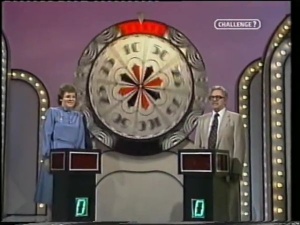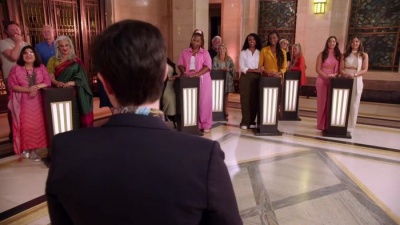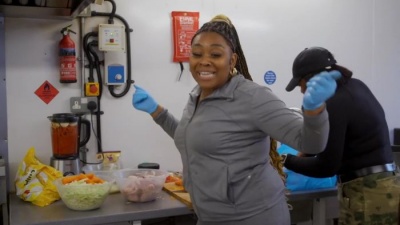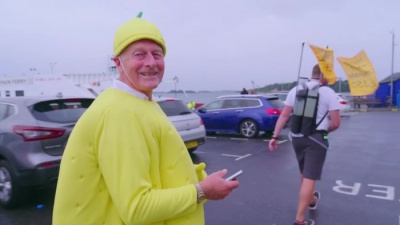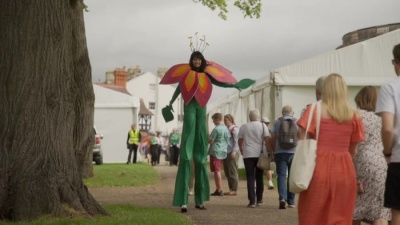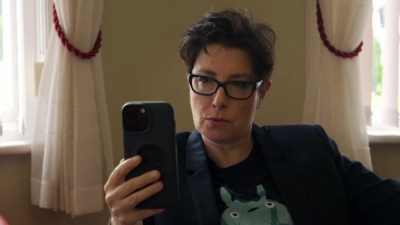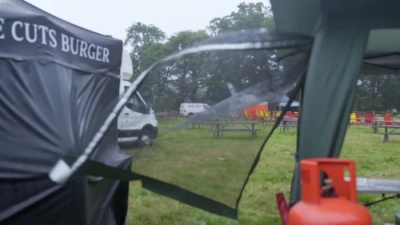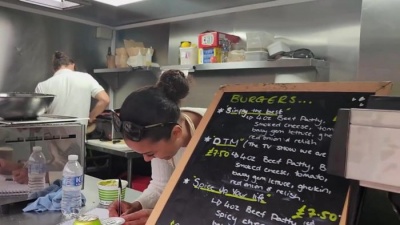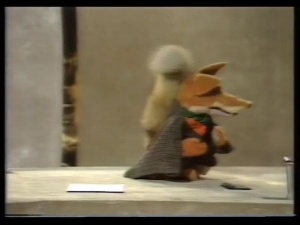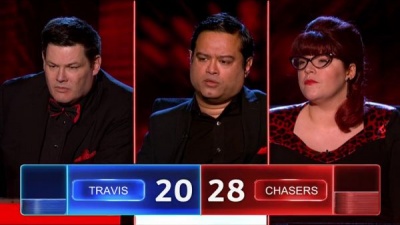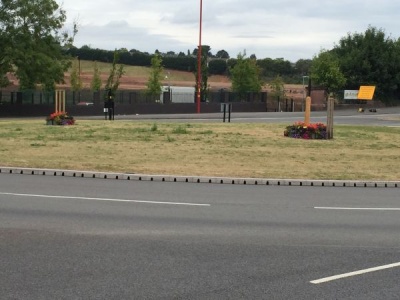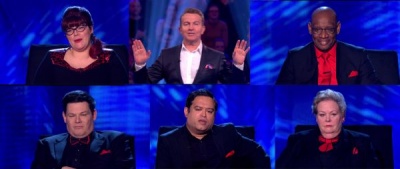Weaver's Week 2024-06-02
Last week | Weaver's Week Index | Next week
This week's review was inspired by the opening round on Name That Tune.
Contents |
Double the Money
South Shore for Channel 4, 9 May – 6 June
Sue Perkins is back on your telly. This shouldn't come as too much of a surprise, because an entertaining and intelligent presenter ought never be too far away. In this series, she asks the contestants to do one thing: double the money.
At the start of the series, each couple is given £250 of South Shore's cash. The challenge: double that dosh in a limited time. As the stakes go up, so does the time allowed – 36 hours when we're going from £250 to £500, three days to get to £1000, and so on all the way to a full month in the final when they go from £10,000 to £20,000.
There is a certain amount of artifice in the show, which we've picked up through osmosis and observation. Before the clock starts, each couple is given some time to plan, work out what they're going to do. In later episodes, they've told the other teams what their plan is before they start; earlier episodes rightly showed the teams making their mark. The time limit is real, but it's not necessarily the same two days for everyone; South Shore will want to get a filming team to the location, and the event will need to be at a good time for our players.
Fairly obviously, all of the businesses have to be legal, we can't have Channel 4 encouraging naughty behaviour. Less obviously, all of the businesses have to be different – a team can't hit on the idea of delivering lemonade punch in week two, and stick with it until week five. In the episodes we've seen so far, the teams aren't allowed to take on employees, because that a) opens the question of paying a legal wage and 2) dilutes the show's premise of following the couples around.
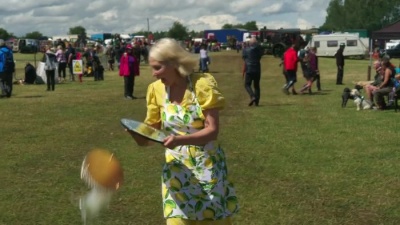 They don't explain that rules stuff on the show. They do show contestants tipping a tray of drinks over.
They don't explain that rules stuff on the show. They do show contestants tipping a tray of drinks over.
Does all this jiggery-pokery matter a whit? No; the contest is fair and above board, the viewer is never deceived, and the little manipulations are only there to make better television.
The episodes begin and end at "The Vault", a wood-panelled room off the lobby of 55 Broadway. You know, the place where they recorded Rise and Fall last year. Unlike that live-in reality show, Double the Money is easy to follow and tells a cogent story.
No fewer than thirteen couples entered the competition, each facing six rounds of increasingly stiff competition. Any team that fails to meet the target one week is off the show, and doesn't get to compete in future rounds. Whichever team makes the most money in the final week will win the title, and a bonus £20,000.
Whatever profit each team makes is theirs to keep, so in the week when you're given £1000 and come back with £1600, you keep the £600 but have to go away and not come back. The next couple, who made £2500, keep £1500 profit and return for more like the gluttons for punishment they are. It's remarkable that, of over 40 enterprises in the opening weeks, just one failed to cover the original stake.
Thirteen teams is a lot to follow, and the opening episodes follow about half of them – some of the teams that made their target without too much drama are going to be presented in short snippets only – and successful teams can land in week four without us properly knowing who they are. The camera is drawn to teams on the bubble, where there's a serious risk of them not turning the required profit. And it's drawn to teams of dramatic people, fractious couples, or those who are doing something very camera-worthy.
Although each venture needs to be different, the producers accept that teams will want to remain fairly close to their comfort zones. So there's a lot of food-based businesses, one team went from selling lemonade on the seafront to selling food at festivals. Others used their existing social graphs to advertise high-ticket events.
From time to time, we reckoned that Double the Money was a bit like that: those who already have advantages will get more riches, and those who don't have advantages won't succeed. One could argue that by showing the excesses – the in-your-face hustling, the succeed-at-all-costs doshbros – by pointing out these indulgences, Double the Money offered a critique of capitalism while appearing to praise it. And that would be a very Channel 4 thing to do.
Almost inevitably, there are going to be comparisons with The Apprentice, a pastiche of business that was inexplicably popular about a decade ago. Leave these comparisons at the door: The Apprentice is people in shiny suits and clacky heels cosplaying at turning a profit, Double the Money actually expects the competitors to do some work. And makes sure they get paid: if the team complete their task, they'll each take home somewhat more than the legal minimum wage (at the time of recording, £10.42 per hour).
But, oddly, we didn't watch Double the Money to find out about the businesses. We were drawn in by the people, the stories and the little dramas they play out. This column finds tearful backstories about the contestants to be tedious, but then we're the sort of old cynic who remembers R Wayne. No, we're here for the dosh – or the pursuit of it. We might not be invested in whether Kevin and Brittney's cheerleading school will succeed, but we are psyched to find if Raine and Slyt can sell enough lemonade to cars stuck in a traffic jam because the road's flooded.
Over the course of the series, we get to know the competitors fairly well. We work out who we'd buy a round of drinks with, and who we'd send to queue at the bar. It's a very simple premise, and South Shore have done well to make it so compelling. Excellent editing keeps the tension up, the teams often don't know themselves whether they've made it or not – and those who are sailing through are revealed well before the end.
Sue Perkins hosts – she's in vision at the start and end, turns up to see one or two of the teams (usually where there's a chance of a free lunch). She also provides a sardonic voiceover, combining the facts and a little bit of snarky opinion.
When we first heard about Double the Money last year, we weren't impressed. The press release gave us nothing to get excited about, being full of the usual peacockery and puffed-up self importance. Indeed, it's description of the game contains more fibs than facts:
- Double the Money will see pairs of contestants come together on day one to receive a modest starting pot of seed money. As soon as they receive the cash the clock starts ticking and their mission is clear: double the money within the next exhilarating few hours or face elimination from the game.
"Pairs of contestants", true. "Modest starting pot", OK, £250 is a long way from £20,000. "As soon as they receive the cash the clock starts ticking", fib. According to Sue, the clock starts "when you get home", because they don't want thirteen different businesses operating around London, or the expense of putting all the contestants up in London hotels. The exact dates may vary from team to team, for entirely practical reasons, but they must all be working in a similar period.
"Double the money within the next exhilarating few hours". No, that reads as if they're looking to increase the dosh inside one day. The actual time ranged from two days to four weeks, judging from the weather it was filmed between June and September last year. And "exhilarating" is not the adjective we'd use: "tense" or "frenetic" or "unpredictable".
The press release goes on to quote Andrew Mackenzie of South Shore:
- this format tests the couples' money-making ideas and their relationships.
That is the core of the show. Father and son have different ideas about how to run a business, about how to cook a baked potato, about where to site a car wash. Through their discussions, we see who the brains of the family is, and who has the final say in most disputes.
Husband and wife, we see who has the ideas and who is the hired help. Another husband and wife, we see who has the commitment to this show and who puts it behind their highly-paid day job. Who thinks they can swan through life with little effort, and who might only be here to boost their social media even higher?
Double the Money is, fundamentally, a very honest show, and it's a slight shame that we heard about it through a press release that wasn't as accurate as it might have been.
Given our column deadlines, we're watching after four episodes, we've not yet seen last Friday's part five or next Thursday's final. Will we tune in? Almost certainly, Double the Money is rather moreish, and whichever couple gets the win will have earned it.
Oh No! Has The Chase Been Cancelled Again?
© All Tabloid Newspapers Everywhere, Next Week
Ever since it was revealed that Mark Pougatch's new show Euro 2024 would take over The Chase's coveted teatime slot, fans have fretted that the Anne Hegerty-led quiz show would be taken off air for good.
In The Chase, contestants come to the studio, answer questions posed by Roman Kemp and Sarah Greene, then drop counters into a machine hopping to be at least as good as a group of star quizzers like Jen Lyons.
The show ends with a final The Chase, where surviving players try to bring home many thousands of points and turn them into prizes like the famous wheelie luggage.
On hearing the news, fans of The Chase were dizzy and raving, and they'll have to talk about this with their doctors. They also took to social media to express their fears.
- "Is it true that The Chase is being taken off air because if so that's ridiculous", wrote Josephine Fictional.
- "Can't believe they're cancelling The Chase! Bradley deserves more than to be replaced by that overinflated balloon", said Theodore Madeup.
- "The Euros? Isn't that the show with the big-voiced bloke asking riddles?" asked Minerva Blatantly-Innvented
- "I'm annoyed! It's not been the same since they changed the person in the corner!" fumed Starrily Dill.
Four of the programme's four million viewers have expressed some mild concern. And we in the tabloid media think we can get readers and clicks and money from their vexation. So we write cheap and rubbish articles like this one, which we've run at least twice before and hope that if we don't mention it's a repeat, nobody will notice. Nobody notices when we run repeats of articles when the show is in repeats, probably because nobody remembers the throwaway original article.
Has The Chase been cancelled forever? Why has Euro Twenty Twenty IV replaced it? And what is the new show even about?
Has The Chase been cancelled?
No. It'll be back.
Despite appearing to have a permanent place on ITV's teatime schedule, The Chase actually runs in series. Every year, the show takes a couple of months off air. It gives Paul Sinha a chance to polish his jokes, and Darragh Ennis gets to perfect his eco-friendly stink bomb.
The Euro tournament will fill in for The Chase during the three week hiatus.
How does Mark Pougatch's The Euros work?
As is traditional, the organisers have kept most of the format under tight wraps. But we have an exclusive insight!
An inside source we've completely made up has given us some hints. The press release — er, insider — confesses that it's got something to do with young men, three pieces of wood, and a grassy rectangle. Two older blokes wearing white coats and blowing a whistle are involved. The objective is to get the ball to hit the wood from at least twenty metres away.
Staged at Brainpool Studios in Cologne, individual events in The Euros will be hosted by local stars like Stefan Raab and by their version of Sam and Duncan, Joko and Klaas. It's expected to attract a crowd of literally a few people, most of whom thought they were going to hear a lecture on Shaun Wallace's collection of treasury tags, and they might leave disappointed.
For tedious reasons our tabloid media autocomplete bot can't be bothered to understand, the BBC has rights to some episodes of The Euro 2024, though these won't be hosted by Mark Pougatch. Honestly, it's like Dickinson's Real Deal turning up on BBC1 and being hosted by Amol Rajan.
When the BBC has rights to The Euros, ITV might show repeats of The Chase. Or they might show a live feed of Jenny Ryan feeding sugarlumps to her ponies, they're keeping details under tight wraps marked "Do not publish before 10 June or we send Robert Peston round to talk at you until he runs out of breath".
Next week: why Race Across the World doesn't go all the way across the world.
In other news
Election season is upon us. At heart, it is a collection of many thousands of individual human dramas. People voluntarily give up their time, and their effort, in the hope that they can improve society for everyone. Some of them will need to give up their job, most will have a family – and not everyone chose to be an MP's spouse or child. However much we disagree with what they say, we must remember that candidates – and agents and canvassers – are people. Let us attack the policy, not the politician – play the ball, not the man.
Two game show winners were in the House of Commons that dissolved this week. Neither is seeking re-election. Dr. Kwasi Kwarteng (University Challenge '95) had been an MP for fourteen years, and finance minister for a period equally brief and catastrophic. Aaron Bell (The Krypton Factor '09) had been an MP for 4½ years, and gave challenge where it was merited. Both men tried to improve society in line with their values, and to the best of their abilities; it is for history to judge how successful they were. They now leave the public stage, and we wish them well in their private lives.
One big show finishes tonight – the Got Talent final (VM1 and ITV, Sun). Another big show starts, Love Island returns (VM2 and ITV2, Mon). Double the Money reaches its final (C4, Thu). Next Saturday's got special editions of In for a Penny (Disney time) and In With a Shout (civilians play footballers in a Soccer Aid special).
Charity fun and funds at 24 Hour Game Show Marathon, a full day of questions, answers, quizzes, panel games, and whatever else they can get away with. All the money's going to help ill children in hospital, and we wish them all the best.
We won't publish next week, so a sneaky look at the second week of June. Bake Off The Professionals runs on Monday and Tuesday (10th and 11th on C4). The Traitors from NBC comes to BBC3 (from Wednesday 12th) with all episodes "dropping" on the I-player. Mark Pugatch's The Euros begins on Friday the 14th, and doesn't move The Chase on opening night.
Photos: Thames, South Shore, BBC, Potato, Weaver.
To have Weaver's Week emailed to you on publication day, receive our exclusive TV roundup of the game shows in the week ahead, and chat to other ukgameshows.com readers, sign up to our Google Group.

